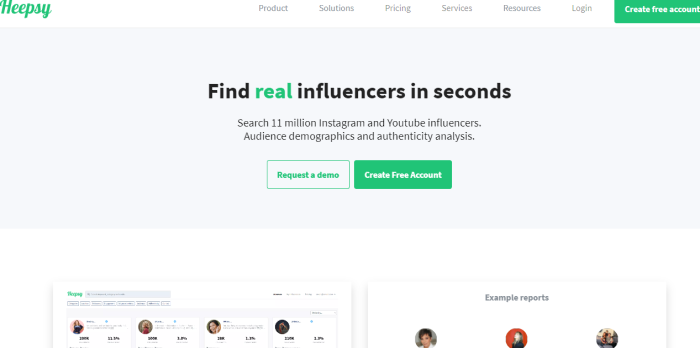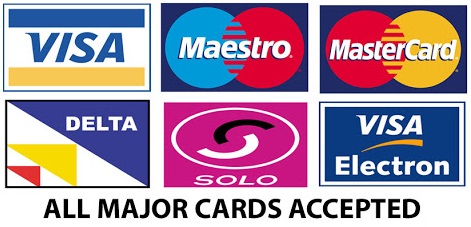
To have a successful e-commerce platform, you have to pay to play. Some of the top US brands spend billions on advertising to secure their internet advertising space.
If you can’t keep up with the big companies that spend billions of dollars on their advertising campaigns, there are still a few ways you can get your brand noticed.
One such method is an influencer promotion campaign. It’s a quick and effective way to help with brand recognition. You could also invest in some tools that will make working with influencers simpler. In this guide, we will break down these unconventional forms of marketing.
How Using Social Media Influencers Can Grow Your E-commerce Brand
Influencer marketing is the practice of working with well-known social media users to grow your brand. For example, if you have a popular skincare line, you might have a well-known lifestyle influencer try your product and tell their audience about their results.
This is a highly effective strategy. In fact, 49% of users say they rely on recommendations from influencers on Twitter to make purchase decisions.
Marketers like influencer promotions too. Nearly 89% of marketers say that influencer marketing campaigns’ ROI is the same or better than other marketing channels like SEO or PPC.
The problem is, most e-commerce brands don’t have the budget to partner with the likes of Kim Kardashian.
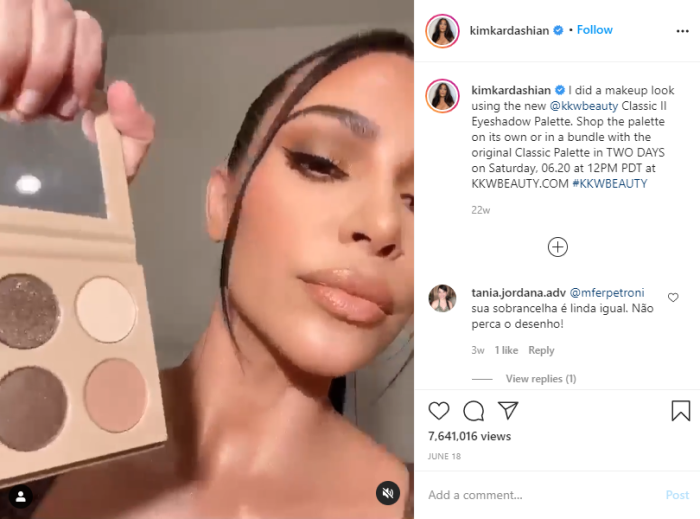
Working with micro-influencers, who have smaller but more targeted audiences, might be the way to go. However, you still have to deal with finding the right influencers, managing communications, making sure influencers create the posts you pay them for, and tracking campaign efficacy.
For smaller e-commerce stores or those with limited budgets, this can be more hassle than it’s worth.
So what’s the answer?
Try using influencer marketing tools for e-commerce brands that make working with influencers easier by bringing the influencers to you.
Why Your E-Commerce Business Should Use Influencer Marketing Tools
E-commerce is a highly competitive market. Currently, there are more than 7 million online retailers. That’s a lot of other stores for users to choose from.
The Baymard Institute found that after going through the difficult trials of browsing products, filling a cart, and committing to a purchase, two out of three users will end up abandoning their cart.
Even if you can grab shoppers’ attention, you also have to keep that attention if you want to drive conversions.
For e-commerce brands, influencer promotion helps leverage your consumer base to do your marketing for you rather than spending thousands on ads that may or may not actually work. Influencer marketing tools can help connect you with hundreds of powerful influencers.
In addition, influencer marketing tools often offer marketing tools such as automated emails that reduce other e-commerce challenges, like cart abandonment.
Here are a few other benefits of influencer marketing tools for e-commerce brands:
- Letting the influencer choose the brand or product means the person using your product is more likely to be genuinely interested in it. This makes their content more authentic.
- Tools give you access to a wider range of influencers instead of focusing on who you already know, including micro-influencers.
- Influencer tools can help you track influencers’ niches, the quality of their audiences, and their engagement rates so you know the influencers you work with are legitimate.
- Tools that take care of all communications, post content, and monitoring, thereby simplifying the process, meaning brands can sit back and enjoy conversions without the hassle of striking and sealing deals.
Statista, a company specializing in market and consumer data, found that 88% of U.S. consumers used coupons for shopping in 2020. Discounts and coupons are proven methods of retaining customers and increasing brand loyalty. 76% of consumers rate discounts as top-ranking factors for purchasing, according to RetailMeNot.
As a marketer, this offers an opportunity to cater to a wider audience while simultaneously promoting products.
By using influencer marketing tools, consumers can get a good deal and value for their money. The added incentive of discounts has the potential to attract new customers by drawing them in with savings and payment options.
Looking for more ways to boost your e-commerce presence? Find out how you can drive 10 times the e-commerce sales with a $0 budget.
Influencer Marketing for E-Commerce: Tools to Help Grow Your Brand
Brands have stepped into the scene and are finding creative ways to leverage consumer marketing techniques.
SwayPay
SwayPay offers discounted rates for influencer promotion, which can offset added costs like shipping, tax, and fees. In addition, SwayPay offers a simplified payment option that tailors itself to consumer needs.
As users browse through online stores, they see special SwayPay pricing available on products. When they go to purchase a product, they will be asked to add their Instagram account handle. Adding this information lets them know what discounts they may be eligible for and how many Instagram posts will be required to earn the discount.
A user’s “sway” determines their discounts, which means the more followers they have, the less they have to pay. This ensures the posts you are trading for will benefit your business, not simply fade out into the social sphere.
In the SwayPay checkout, the user will pay the full dollar amount of the product, without the discount. Then, they have 30 days to make the required posts and keep their discount.
This means a shopper could pay for a $150 item with $90 and two Instagram posts. SwayPay requires shoppers to tag them in each post, so compliance is mandated.
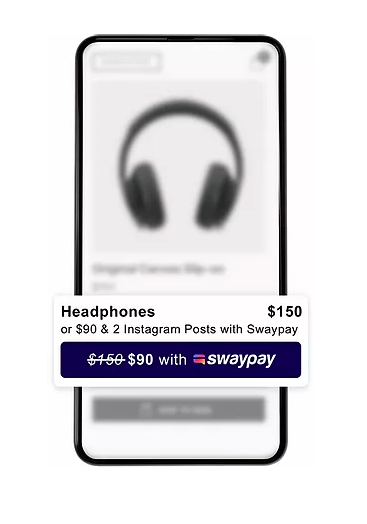
For businesses, this system opens up a range of new conversion opportunities. Customers are now incentivized to complete their purchase and engage in online marketing of the product.
The SwayPay app boasts their retailers receive twice the number of branded Instagram posts, 17% engagement increases on SwayPay posts, and up to 13% of all processed sales coming through their app.
Currently, the app only works with Shopify and Instagram. They are hoping to branch out in the coming quarters and integrate their platform with the likes of TikTok and BigCommerce.
SwayPay plans to introduce more ways to sway, such as a SwayScore that would score user purchases and reward them with extra discounts or prizes. They also plan to implement a Live Receipt feature to let users generate sales more directly through affiliate payments.
At the moment, SwayPay offers the best ease and accessibility for consumers. Seeing the discount at point-of-purchase as well as a clear and direct promotion task is unique and, if their strategy works out, will help brands connect with influencers more often and more efficiently.
Dealspotr’s Influencer Marketplace
Dealspotr is an online platform that connects influencers to brands and offers discount codes through their website. They call themselves “the LinkedIn of influencer marketing” and are essentially a meeting place for brands and influencers.
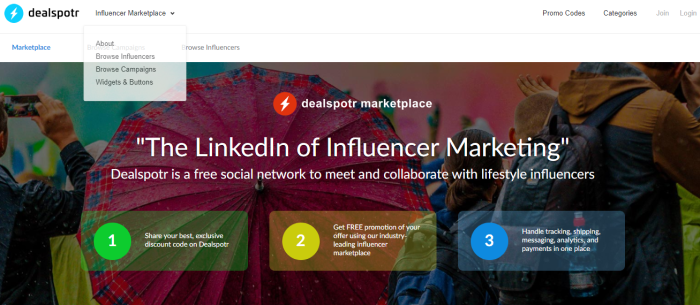
Brands can offer “free product campaigns” that supply products directly to influencers, or they can choose a “promotional fee campaign”, where they pay influencers a designated rate in exchange for promotions.
This gives brands greater visibility without having to find the right influencers and adjust the process based on what works best for your brand. For example, you can offer influencers an exclusive discount code for their followers or partner with specific influencers that fit your niche.
You can fund an influencer campaign with as much or as little as you like, though Dealspotr does recommend offering at least $100 if you want to work with small to medium-sized influencers.
Unlike SwayPay, Dealspotr doesn’t offer a point-of-sale option. That means their customers can set up deals on the platform but will have to find workarounds to get those discounts applied to their orders.
Heepsy
Heepsy is an influencer search and marketplace that connects brands with more than 11 million influencers on sites like Instagram, YouTube, TikTok, Twitter, and Facebook.
Like other influencer tools for e-commerce, Heepsy makes it far easier to connect with influencers. In addition, Heepsy provides data about influencer audiences, engagement rates, and gives influencers an “authenticity score.”
You can also create influencer lists, make sure they don’t have a ton of fake followers, and even monitor the effectiveness of campaigns.
All this data makes it easier to find the right influencers for your e-commerce brand — and make sure your influencer campaigns are driving sales.
If you don’t want to deal with managing the influencer process, Heepsy can handle it for you with their influencer campaign management service.
Shopify
Shopify is best known as an e-commerce solution for building stores. However, there’s a lesser known tool you can use with influencer marketing as well.
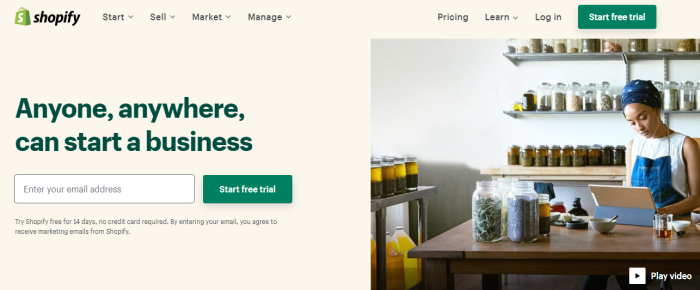
Shopify also offers group discount options, which can help you create special rates for your influencer community. By using the code, influencers can receive a predetermined commission based on your agreement.
You can also add influencers to a specific customer group so that no one else can use that code — which protects you from giving deep discounts to everyone if the code gets leaked.
While not as full-featured as some of the other influencer marketing tools (there are no pay features or influencer marketing metrics, for example), this is an easy way to leverage influencer marketing if you already have a Shopify account.
Conclusion
As the popularity of e-commerce continues to grow, finding cost-effective advertising platforms will become more and more important.
You can offer customers discounts on products in exchange for Instagram posts. These posts act as influencer marketing channels and allow your products to be seen by more people, more often.
By offering discounted rates, which research says improves buying behaviors, you open up your market to new customers.
Likewise, tapping into influencer promotion is a great way to spend less on advertising and keep your budget where you want it to be.
What benefits have you found through influencer marketing for e-commerce?
The post Influencer Marketing for E-commerce: Tools and Tips to Grow Your Brand appeared first on Neil Patel.
source https://neilpatel.com/blog/influencer-marketing-ecommerce/

